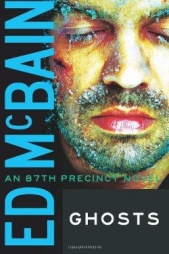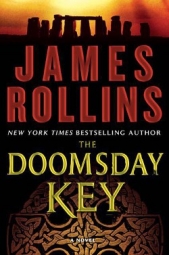Ghosts

Ghosts читать книгу онлайн
It’s Christmastime and Detective Carella gets assigned three murders — including a bestselling author of ghost stories — and is soon after ghosts, mediums, and a crazed killer.
Внимание! Книга может содержать контент только для совершеннолетних. Для несовершеннолетних чтение данного контента СТРОГО ЗАПРЕЩЕНО! Если в книге присутствует наличие пропаганды ЛГБТ и другого, запрещенного контента - просьба написать на почту [email protected] для удаления материала
“At six-fifteen?”
“Six-fifteen, right.”
“Was Esposito still there when she left?”
“He was still there.”
“How do you know?”
“He asked me for another Rob Roy, and he also commented that those were the biggest tits he ever saw in his life.”
“Good, so now it’s six-fifteen,” Carella said. “Was he still there at six-thirty?”
“I gave him his tab at six-thirty.”
“How do you know it was six-thirty?”
“Because the news was going off.”
“Did he leave when you gave him his tab?”
“He paid it first.”
“And then did he leave?” Hawes asked.
“He left,” Brogan said, and nodded.
“At six-thirty?”
“A few minutes after six-thirty, it musta been.”
“How do you know it was Esposito who left?”
“He gave me a five-dollar tip. He said the five bucks was for the floor show.”
“Why couldn’t you remember all this when we first asked you?” Hawes said.
“Because everything in life has a beginning, a middle, and an end,” Brogan said, and shrugged philosophically.
He had, at long last, established Warren Esposito’s alibi. The man had been at Elmer’s, drinking and watching an impromptu ecdysiastical performance, just about when his wife was being stabbed to death on the sidewalk outside their building.
They were back at the beginning again, and the middle and end seemed nowhere in sight.
At 6:00 that night, car Boy Seven of the 12th Precinct was dispatched to 1134 Llewlyn Mews to investigate what the caller had described as “screaming and hollering in the apartment.” It was a peculiar fact of police nomenclature in this city that precincts like the 87th and the 63rd were familiarly and respectively called the Eight-Seven and the Six-Three, whereas all precincts from the 1st to the 20th were called by their full and proper designations. There was no One-Six in this city; it was the 16th. Similarly, there was no One-Two; the men who responded to the call in the Quarter that day after Christmas were cops from the 12th.
They got out of the RMP car, stepped over the bank of snow at the curb, and gingerly made their way across the slippery sidewalk to a sculpted black wrought-iron fence surrounding a slate courtyard. They opened the gate in the fence and went through a small copse of Australian pines to the bright orange front door of the building. One of the patrolmen lifted the massive brass knocker on the door and let it fall. He repeated the act four times and then tried the knob. The door was locked. There was no sound from within the place now; they assumed at once that they’d be calling in with a 10-90—an “Unfounded.” But being conscientious law enforcement officers, they went around the side of the building and through a small garden banked high with snow, and rapped on the back door, and then peered through a window into a kitchen, and then rapped on the door again, and tried the knob. This door was open.
One of the patrolmen stuck his head into the kitchen and yelled, “Police officers. Anybody home?”
There was no answer.
He looked at the other patrolman. The other patrolman shrugged. Tentatively they entered the apartment, somewhat uncertain of their rights, knowing only that they were responding to a call and supposing it was their duty to investigate thoroughly, especially in view of the unlocked back door—which they guessed they could say indicated forced entry, if push came to shove.
In the wood-paneled library they found a dead man wearing a red smoking jacket with a black velvet collar.
The detective/2nd from the Twelfth Squad was a man named Kurt Heidiger, who responded to the homicide alone because his partner was home sick with the flu and because the squadroom was a madhouse today and nobody could be spared to accompany him. He established at a glance that the probable cause of death was multiple stab wounds, and he learned from the neighbor across the mews—the woman who’d placed the Emergency 911 call—that the dead man’s name was Daniel Corbett, and that he worked for a publishing firm called Harlow House.
Heidiger was a smart cop and a prodigious reader. When the city’s papers weren’t on strike, and that was rarely, he read all three of them from first page to last every day of the week. He recalled reading on Friday about the death of a writer named Gregory Craig—whose book Deadly Shades he had also read—and he remembered seeing a black-edged in memoriam notice on the book page of this morning’s edition of the city’s more literary newspaper; the notice had been placed by a publisher called Harlow House. Primarily he remembered that Craig had been the victim of a brutal stabbing. There probably was no connection, but Heidiger was too smart and too experienced to allow even the smallest of possibilities to go unexplored. When he was through with all the Medical Examiner-lab technician-Homicide Division bullshit at the scene, he went back to the office and checked with Headquarters for the name of the detective investigating the Craig murder. He called the 87th Precinct, was connected with the squadroom upstairs, and was told by a detective named Bert Kling that Carella had gone home at a little after four. He reached Carella in the Riverhead house at a quarter past 8:00. Carella listened attentively and then told Heidiger he’d meet him at the scene in an hour.
It looked as if they had another companion case.
Jennifer Groat was a tall bony blonde in her late forties, her hair piled haphazardly on top of her head, the front of her long blue robe stained with what looked like either mayonnaise or custard. She explained that she was just getting ready for bed. The holidays had simply exhausted her, and now this had to happen. She made it plain from the moment she admitted the detectives to her apartment that she was sorry she’d called the police at all. In this city, it was best to mind your own business and go your own way.
“When you called 911,” Heidiger said, “you mentioned that you heard screaming and hollering in the Corbett apartment…”
“Yes,” Jennifer said, and nodded.
“We have the call clocked in at five-fifty-three, is that about right?”
“Yes, it was a little before six.”
“What kind of hollering and screaming did you hear?”
“What kinds of hollering and screaming are there?” Jennifer said. “Hollering and screaming is hollering and screaming.”
“By screaming…”
“Somebody screaming at the top of his lungs.”
“And by hollering?”
“I don’t know what the person was hollering.”
“Was he hollering for help?”
“I don’t know.”
“Was it the same person doing both the hollering and the screaming?”
“I don’t know. I heard the noise over there, and I called the police. There’s always noise over there, but this was worse than usual.”
“What do you mean?” Carella asked at once. “What kind of noise?”
“Parties all the time. People drinking and laughing at all hours of the night. Well, you know. With the kind of friends Mr. Corbett had…” She let the sentence trail.
“What kind of friends were they?” Heidiger asked.
“You know.”
“No, I’m sorry, we don’t.”
“Pansies,” she said. “Fruits. Faggots. Gay people,” she said, stressing the word “gay” and pulling a face.
“Homosexuals,” Carella said.
“Queers,” Jennifer said.
“And they were partying all the time, is that it?”
“Well, not all the time. But enough of the time. I’m a telephone operator, I work the midnight shift, I try to catch a little nap before I leave the house each night. With all the noise over there, it’s impossible. I was about to take my nap now, in fact. If it isn’t one thing, it’s always another,” she said, and again grimaced.
























